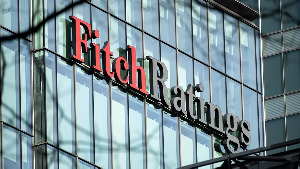Fitch Ratings has upgraded its outlook for the Ghanaian banking sector, citing improved solvency and a more stable operating environment.
In a report assessing the solvency of Ghanaian banks, the agency attributed the positive shift to the almost completion of the sovereign debt restructuring and the gradual stabilisation of the Ghanaian economy.
The agency observed that strong profits driven by high treasury bill yields were fuelling a capital recovery of Ghanaian banks for 2023 and 2024.
According to the rating agency, this trend is crucial as regulatory interventions from the Central Bank relating to the Domestic Debt Exchange Programme (DDEP) are set to expire by the end of 2025.
The DDEP, implemented in late 2022, significantly impacted bank capital, but regulatory measures have helped mitigate these losses.
The report highlighted that the successful conclusion of the Eurobond exchange in October 2024 had improved Ghana’s access to international finance and eased local currency liquidity pressures.
This, coupled with the anticipated decline in macroeconomic volatility, including increased GDP growth and stabilised inflation, is expected to further reduce risks for the banking sector.
The report noted that while the sovereign default posed solvency challenges, the Ghanaian banking sector’s reliance on domestic deposits had largely insulated it from acute liquidity pressures.
Fitch expects the external debt restructuring to be completed soon, further enhancing the operating environment for Ghanaian banks.
The agency anticipates that the majority of banks will achieve capital compliance by year-end 2025 as capital levels continue to strengthen.
This positive outlook for the Ghanaian banking sector comes as a welcome development, signalling a gradual recovery from the economic challenges faced by the country in recent years.
Agbodza gives details of actual kilometres of road constructed by the Akufo-Addo government



